EDMONTON — A wildfire that forced the evacuation of a town west of Edmonton continues to menace the community with crews also battling heavy, vision-obscuring smoke.
Edson Mayor Kevin Zahara said the fire remains within 1.5 kilometres of his town’s southern edge.
“If it does flare up, we don’t have a lot of opportunity or a lot of time (to react),” Zahara said Monday in an online video update.
“It is still very dangerous.”
The evacuation order remains in place for Edson and for adjoining sections of Yellowhead County and won’t be reassessed until Wednesday at the earliest.
Various roads and highways remain closed.
“The risk for this fire moving in different directions in the next two days is extreme,” said Luc Mercier, the chief administrative officer of Yellowhead County.
He said almost 500 crews, on the ground and in the air with helicopters and water bombers, are fighting the flames.
The 8,400 residents of Edson, 200 kilometres west of Edmonton, were forced to flee Friday after flames jumped fireguards.
Christine Beveridge, Edson’s chief administrative officer, said some residents are returning despite the evacuation order.
Beveridge urged those returnees to leave, saying they are making the situation worse for crews trying to focus on the blaze.
“We have had a lot of people come back to the community in the last couple of days,” said Beveridge.
“Please obey the order and stay out.
“If we need to deal with these fires and we’ve got to be dealing with getting individuals out of our community again, that unfortunately leads to a very dire situation for first responders as well as for yourselves.”
Beveridge said there are a number of factors to consider before allowing people to return, such as ensuring critical infrastructure is fine and the hospital is ready to accept patients.
Zahara and Mercier said work continues building fire breaks and securing critical infrastructure in south Edson.
In Edson, firefighters have been going door-to-door moving flammable items including propane tanks and wood piles away from houses and other structures.
Peace officers and members of the RCMP are also doing regular patrols.
This is the second time Edson residents have been forced to flee the wildfires in just over a month. Residents were out for three days in early May.
As of Monday, there were more than 14,000 residents out of their homes due to fires scattered through the northern and western areas of the province.
Provincewide, about 2,700 crews from as far way as New Zealand and Australia have been helping local firefighters and members of the Canadian Armed Forces contain the blazes.
Officials said Monday more crews are arriving from Costa Rica and Chile.
In Alberta’s far north, an evacuation order has been in place for two weeks in and around Fort Chipewyan.
The order includes the Mikisew Cree First Nation, the Fort Chipewyan Métis Nation and the Athabasca Chipewyan First Nation.
Also in northern Alberta, there is an evacuation order for the area in and around Fox Lake, west of Fort Chipewyan.
Public Safety and Emergency Services Minister Mike Ellis said rain is expected to provide some relief over the next couple of days, but said the situation remains critical and there is a long fire season ahead.
“We are still very early in the wildfire season,” said Ellis.
“We’re only two-and-a-half months into a seven-month period stretching out until the end of October.
“This could be a long and very challenging summer.”
This report by The Canadian Press was first published June 12, 2023.
Dean Bennett, The Canadian Press



